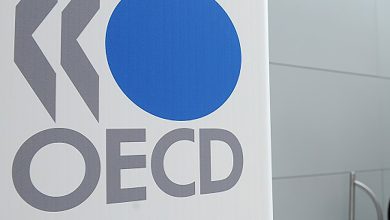Moody’s ups Türkiye’s rating by 2 notches with positive outlook

Moody’s on Friday upgraded Türkiye’s credit rating, citing improved governance, a tighter stance on monetary policy, and progress on inflation, while maintaining the country’s outlook as “positive.”
The sovereign credit rating was raised by two notches, from “B1” to “B3,” and marked Moody’s first upgrade for Türkiye in more than a decade.
The reasons were listed as “improvements in governance, more specifically the decisive and increasingly well-established return to orthodox monetary policies, which are yielding the first visible results in terms of reducing the country’s major macroeconomic imbalances,” it said.
Backed by President Recep Tayyip Erdoğan and spearheaded by Treasury and Finance Minister Mehmet Şimşek, Türkiye has been implementing a tight monetary and fiscal policy since last year to tackle soaring inflation.
“Moody’s raised our credit rating by two notches for the first time!” Şimşek wrote on social media platform X.
“Thanks to the program we are implementing, Moody’s upgraded our country’s credit rating after 11 years and maintained a positive outlook.”
While inflation and domestic demand have started to moderate, inflationary pressures “are expected to ease significantly in the coming months and into 2025,” the ratings agency said.
In June, the country’s annual inflation rate began what is expected to be a sustained fall, dipping more than expected to 71.6% from 75.45% in May.
The agency also noted that Türkiye’s central bank is rapidly enhancing the credibility of monetary policy, which in turn is helping to restore confidence in the Turkish lira.
“Moreover, the tight policy stance is already materially reducing Türkiye’s elevated external vulnerability,” said the statement.
The Central Bank of Republic of Türkiye (CBRT) hiked its benchmark policy rate by 4,150 basis points since June 2023, as authorities reversed a yearslong low-rates policy.
The bank has recently said it will maintain its tight stance until a permanent decline in inflation is achieved. In June, it reiterated that disinflation would take hold in the second half of the year.
“The rating increase was influenced by economic balancing, reduced external financing needs, increased international reserves, and the disinflation process,” said Şimşek.
“Maintaining a positive outlook reflects confidence in our program and indicates potential rating upgrades,” he added.
Last month, the international crime watchdog, Financial Action Task Force (FATF), removed Türkiye from its “grey list” of countries that require special scrutiny, in a boost to the country’s economic turnaround plan.
Moody’s is the first credit ratings agency to announce new ratings for Türkiye following the FATF decision.
“The positive outlook reflects a balance of risks skewed to the upside,” it said.
As the credibility and effectiveness of monetary policy increases, macroeconomic stability and stronger institutions may allow Türkiye’s underlying credit strengths, such as its diversified and competitive economy and comparatively strong fiscal and debt metrics, to come forward again, it added.
It noted that this would be realized especially if the shift in the conduct of macroeconomic policy is accompanied by structural changes that reduce the risk of long-lasting inflation shocks in the future.
Moody’s also raised Türkiye’s local currency country ceiling to “Ba1” from “Ba3.”
“The three-notch gap between the local-currency ceiling and the sovereign rating reflects the prospect for a further reduction in external imbalances and improving monetary policy effectiveness, as well as a relatively limited government footprint in the economy,” it said.
Türkiye’s foreign currency ceiling, meanwhile, has also been raised to “Ba3” from “B2.”
“The two-notch gap between the foreign-currency and local-currency ceilings takes into account reduced external vulnerability risks,” it explained.
Moody’s, however, noted that the level of dollarization in Türkiye remains high and confidence in the lira has not yet been fully restored.
On the other hand, the central bank’s sharp tightening has restored confidence in and attractiveness of the currency, which can be seen in the increase in lira deposits, which are currently averaging close to 60%, it said.
The agency revised Türkiye’s outlook to positive from stable earlier in January and affirmed the “B3” credit rating at the time.
In March, Fitch Ratings also upgraded Türkiye’s credit rating from “B” to “B+” and its outlook from stable to positive, while S&P has also raised its grade to “B+” from “B” and assigned a positive outlook.
Moody’s expects consumer inflation to sharply decrease to below 45% by December, helped by the slowdown in domestic demand that is currently underway and with appreciation in the real exchange rate.






